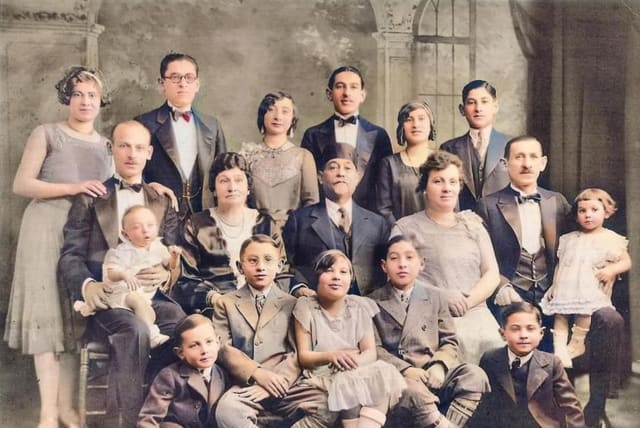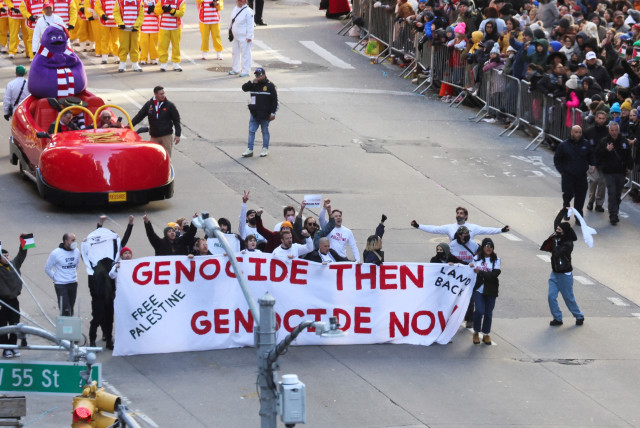Editor's Notes: Giving thanks, even in the darkness

As I reflect on how far we’ve come, and how different the state of our people is today compared to back then, I cannot help but give thanks.
One hundred and three years ago, on Thanksgiving Day 1920, the SS Kroonland arrived in New York Bay, having made the lengthy voyage across the Atlantic from Antwerp. Due to the holiday, the immigration offices at Ellis Island were closed, and so the passengers had to remain on board for another day. Finally, the next morning – Friday, November 26 – they were permitted to disembark. Among them were the 12 members of the Wolkowicz family of Czestochowa, a city in southern Poland that was nearly a third Jewish and had seen several deadly pogroms, the most recent only a year and a half earlier.
The youngest of the Wolkowicz clan – who would later Anglicize their family name to Walker – just three months old, was registered as Abel, and his ethnicity, like that of his parents and siblings, was recorded as “Hebrew.” Abel’s full name was Abraham Abba and he later became my grandfather.
Giving thanks is inherent to the Jewish tradition. The first words many Jews utter upon opening their eyes in the morning are Modeh ani, “I give thanks.” The morning prayer service, Shacharit, contains psalms that start with the phrase, “Give thanks to the Lord.” Among the main sacrifices performed in the Temple in Jerusalem was the thanksgiving offering, which today has been replaced by a blessing known as HaGomel, recited in public upon deliverance from illness or danger. The very word “Jew” is derived from the tribe of Judah (Yehuda), the name of which is bestowed in a verse in the book of Genesis in which the matriarch Leah expresses thanks (odeh) to God for her eponymous son. Gratitude is at the very core of our national and religious identity.
To many Jews, then, the notion of a holiday dedicated entirely to thanksgiving might seem superfluous (as does the weeks-long hullabaloo surrounding the holiday meal, which isn’t terribly dissimilar to the large meals many Jews prepare and host twice a week, every week, on Shabbat).
We express gratitude as a matter of course. Why have a special day for it?
This year, the holiday also comes at a particularly painful time in the life of our people. As Israelis and Jews around the world mourn those murdered on October 7 and killed in action in the military campaign that came in its wake, as we are wrought with anxiety over the fate of the hostages held by Hamas in Gaza, and as the challenges facing Israel and the Jewish people seem greater and more dire than they have at any point in recent memory, the notion of giving thanks may seem to some as incongruous at best.
But it is perhaps precisely at a moment like this that giving thanks is most needed, to remind us that even when things seem particularly bleak, even when it feels as though the darkness is closing in, the blessings in our lives – and in our national life – are worthy of appreciation.
When my grandfather and his family fled Poland a century ago, they left behind a continent in which hatred of Jews had been festering for centuries and in which it would soon surge to monstrous, cataclysmic heights.
Their hometown was no exception; in some respects, it was a microcosm. The Czestochowa Pogrom that tore through the city in August 1902 resulted in the deaths of 14 Jews; five Jews were killed in an antisemitic rampage in May 1919. After the German army entered the city in September 1939, they set about creating the Czestochowa Ghetto, cramming some 48,000 Jews into a small corner of the city. The Nazis liquidated the ghetto in September 1942, sending nearly all of the city’s Jewish residents to Treblinka, where virtually all were murdered. Of the 5,000 Jews who were kept behind as slave labor, some rose up against the Nazis in June 1943; thousands were killed in the fighting and hundreds were burned alive or buried under rubble. Fewer than 50 Jews remain in Czestochowa today.
As I reflect on how far we’ve come, and how different the state of our people is today compared to back then, I cannot help but give thanks.
I am thankful, first and foremost, for the State of Israel, which has transformed the story of our people in ways that would have been beyond the wildest dreams of Jews in the early part of the 20th century and at any point in the two millennia prior.
There have been some – including senior officials – who have compared the events of October 7 to the Holocaust. Tempting as such a comparison might be given the sheer cruelty and scale of the Hamas atrocities, and the horrific images that have seemed eerily familiar, it couldn’t be more wrong.
There is a fundamental difference between what transpired in southern Israel seven weeks ago and what took place in Europe in the middle of the last century, and we have seen it on full display in recent weeks. The capacity to pursue our foes and deal them a devastating blow, the knowledge that no assault on our people will go unpunished, and the fact that Jewish blood – in the words of one Israeli leader – “now has a price” make our reality as different from the reality of a century ago as one could possibly imagine. The existence of a place in which we are the masters of our own destiny, in which the only government to which Jews are subject is their own, and in which we are free to exercise our own power has made the Jewish people safer and more secure than they have been at any point in the past two thousand years.
Internal squabbling, security threats, and other challenges – some consequential, others less so – sometimes obscure the miracle that is this place. We shouldn’t let them. I am thankful to be alive at a time when Israel exists and I am thankful to live in the sovereign Jewish state.
I am also thankful for America. A century ago, it gave my family – and tens of thousands of other Jewish families – a place to call home when they so sorely needed one. It has offered Jews unparalleled freedom and opportunity since its creation in 1776. And today it is the best friend Israel could hope for.
Policy differences and occasional disagreements notwithstanding, the fact that the President of the United States flew across the world to be with the people of Israel in our time of pain is nothing short of incredible. The steadfast diplomatic backing, the moral support, the financial and material assistance, and the close cooperation between our two countries’ militaries – some of which is public, much of which is not – make this an alliance unlike any other and one for which we should be hugely grateful.
It hasn’t always been like this, and the intertwined histories of America and the Jewish people are punctuated by painful episodes of hardheartedness and discrimination, but we are deeply fortunate to live in a time when the leader of the free world wears his affinity with the Jewish community and his love of the Jewish state on his sleeve, reflecting the sentiments of most Americans.
I am thankful for our many allies around the world. Never have I received more heart emojis than I have over the past seven weeks, as friends – both Jews and non-Jews – have reached out to express their love, compassion, and support. At a time when so many Jews feel so very alone, it is heartening to know that there are people of conscience who know right from wrong, good from evil, and who stand with us in our time of need.
I am thankful to be part of the Jewish people. What I experienced at last week’s historic march for Israel in Washington was a potent reminder that we are part of a global family that celebrates together, cries together, and bands together when times are tough. We may not be huge, but we are a force to be reckoned with, and the knowledge that, no matter what happens to us, we have millions of fellow Jews who feel what we are feeling and will do whatever they can to help is a source of tremendous comfort and strength.
And I am thankful to be part of the Israeli people. While we have experienced the most traumatic event in most of our lifetimes, and one of the most traumatic in the history of our country, we have shown the world – and, perhaps more importantly, ourselves – how we rise to the occasion when we are called upon to do so. The wave of volunteerism, of generosity, and of solidarity that has swept through this country as Israelis have mobilized to support those most directly affected by the events of October 7 and their aftermath has been striking to behold. If our enemies thought they could tear us apart, they have another thing coming. The Israel that we have experienced over the past seven weeks is stronger, more resilient, and more united than I have ever seen before.
A little over a century ago, this day gave my family something to be thankful for, as the continent they left behind descended into the abyss. As families across Israel, America, and the world come together this weekend, let us hope the days and weeks ahead give us all – and particularly the families of the hostages – more reasons to be thankful, and let us commit to seeking them out, even in the darkness.
Happy Thanksgiving.
Jerusalem Post Store
`; document.getElementById("linkPremium").innerHTML = cont; var divWithLink = document.getElementById("premium-link"); if (divWithLink !== null && divWithLink !== 'undefined') { divWithLink.style.border = "solid 1px #cb0f3e"; divWithLink.style.textAlign = "center"; divWithLink.style.marginBottom = "15px"; divWithLink.style.marginTop = "15px"; divWithLink.style.width = "100%"; divWithLink.style.backgroundColor = "#122952"; divWithLink.style.color = "#ffffff"; divWithLink.style.lineHeight = "1.5"; } } (function (v, i) { });

